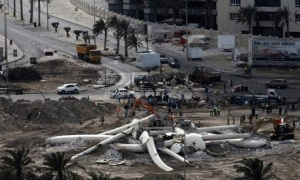
Bahrain destroys the Pearl Monument while UN looks the other way.
(Image by Anorak.co.uk) Details DMCA
In the violent crackdown that followed only one day after the arrival of the "Peninsula Shield" force, more than a dozen people were killed, hundreds were injured, and still more remain missing. The leaders of all but one of the main opposition groups were arrested in turn. The military "liberated" Bahrain's main hospital, where relatives of those killed and injured had been camped. At last, martial law was declared and the symbol of the entire uprising--the Pearl monument--was unceremoniously demolished. If it's gone that means nothing ever happened, right?
While no one is likely soon to forget the patch of barren land that just two weeks ago was "Martyrs' Square," life in Bahrain is indeed slowly returning to normal. Curfews have been shortened. Roads have been reopened. First elementary and now middle school students have returned to classes. Malls, hit hard by the turmoil as has Bahrain's entire economy, have been keen to bring back shoppers, advertising their hours on Twitter and Facebook. And, most telling of all, the thousands who gathered last Friday for the sermon of Bahrain's highest Shi"a religious authority, Sheikh "Isa Qasim, did not continue on to a customary post-prayer rally; they simply returned home.
At the same time, however, untouched by this outward improvement remains Bahrain's underlying political conflict, which today is no closer to resolution than when protests began. On the contrary, emboldened by their decisive military victory over the demonstrators, Bahraini authorities have shown little eagerness to resume talks about political reform. The opposition, they see, is in no position now to be making political demands, and the government is in no mood to entertain them.
More generally, Bahrain's rulers appear less concerned with political reconciliation than with punishing those they view as having demonstrated disloyalty to the country over the course of the previous two months. On Saturday the Ministry of Education announced the cancellation of 40 academic scholarships held by students who took part in anti-government protests. The state-run University of Bahrain has formed an investigative committee to probe students' online postings relating to a violent confrontation on March 13 between student protesters and government supporters, vowing punishment for those "found guilty."
Elsewhere, Sunni lawmakers have called for still more official inquiries into workers who took part in a week-long general strike suspended just five day ago; while others have sought to block the return of dozens of Shi"i officials and ministers who resigned in protest after the first demonstrators were killed. As captured by the title of a widely-circulated op-ed in the government-run Gulf Daily News, the priorities of the government and its supporters are "Security, Accountability" and THEN Dialogue."
It is one thing, then, for the U.S. to remain silent while an important ally puts down an existential threat to its security. Yet to watch idly as the Bahraini government continues down the very path that laid the groundwork for the current crisis is an unacceptable position. If the ill-concealed impetus behind U.S. policy in Bahrain is the regional threat posed by Iran, how better to ensure a self-fulfilling prophecy than to allow the further economic, social, and political marginalization of Shi"a in the post-Day of Rage Bahrain? The United States must push both parties back to the National Dialogue Initiative of Crown Prince Salman, ideally with Kuwaiti arbitration.
Update: the Telegraph is reporting that "Saudi officials say they gave their backing to Western air strikes on Libya in exchange for the United States muting its criticism of the authorities in Bahrain." It's all starting to make more sense.
| Rate It | View Ratings |
I am a current Ph.D. candidate in Political Science at the University of Michigan. I spent most of 2007-2008 in Yemen and the rest of 2008 through summer 2009 in Bahrain conducting dissertation research. I am now in Doha completing a post-doc at a (more...)
The views expressed herein are the sole responsibility of the author
and do not necessarily reflect those of this website or its editors.

OpEdNews depends upon can't survive without your help.
If you value this article and the work of OpEdNews, please either Donate or Purchase a premium membership.
STAY IN THE KNOW
If you've enjoyed this, sign up for our daily or weekly newsletter to get lots of great progressive content.
If you've enjoyed this, sign up for our daily or weekly newsletter to get lots of great progressive content.
Most Popular Articles by this Author: (View All Most Popular Articles by this Author)
Crime and Punishment in Bahrain
Where's the "Cooperation" in "Gulf Cooperation Council"?
To View Comments or Join the Conversation:



